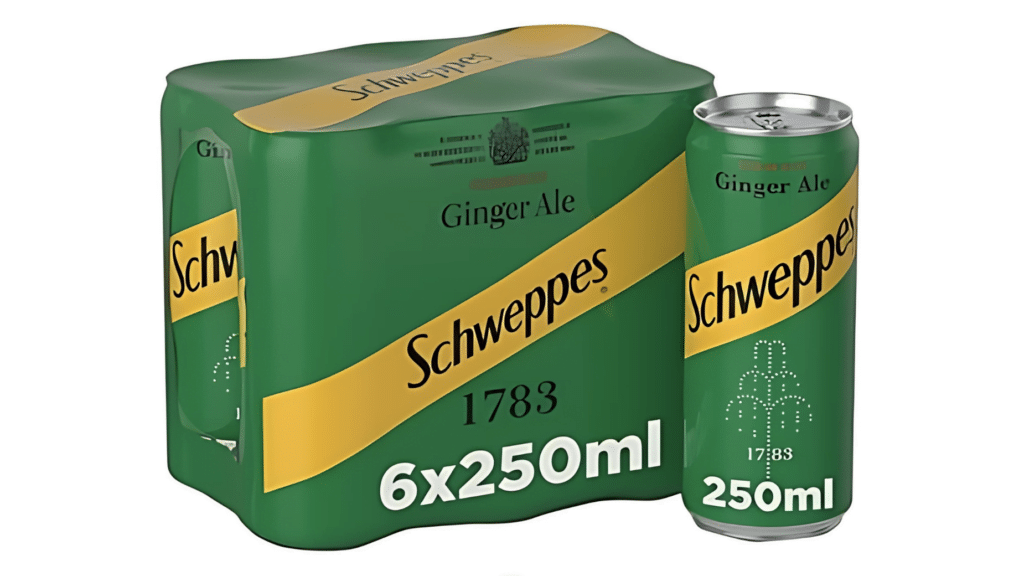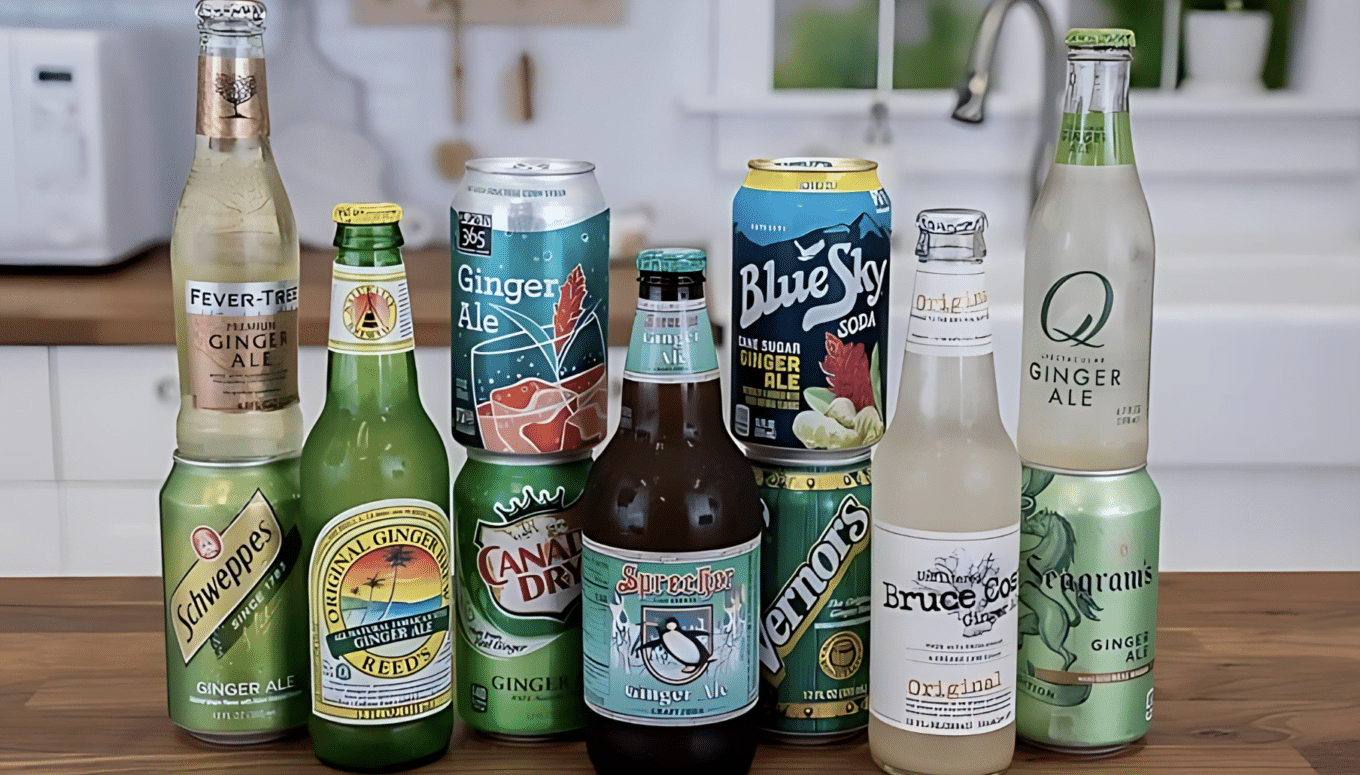Ginger ale, a fizzy drink many love, often sparks questions about its ingredients. You might wonder if this bubbly beverage contains caffeine, especially if you’re watching your Intake.
Most people assume all sodas have caffeine, but that’s not always true. Ginger ale is usually caffeine-free, making it a great choice for those looking to avoid the stimulant.
This post will explore the world of ginger ale, its benefits, and why it typically doesn’t contain caffeine. We’ll also look at popular brands and their formulations.
By the end, you’ll clearly understand what’s in your ginger ale and be able to make informed choices about your drink.
Let’s dive into the refreshing world of this spicy-sweet soda and uncover its secrets.
Understanding Ginger Ale
Ginger ale is a popular fizzy drink with a unique flavor. It’s a mix of carbonated water, ginger, and sweeteners. The ginger gives it a special kick that sets it apart from other sodas.
This bubbly drink has been around since the 1800s. It started as a remedy for upset stomachs. Irish doctor Thomas Cantrell made the first ginger ale in the 1850s.
But the modern version we know came from Canada in 1904, thanks to John McLaughlin.
Ginger ale isn’t just for tummy troubles anymore. People enjoy it on its own, use it in cocktails, or sip it for its refreshing taste.
It’s a versatile drink that’s found its way into many people’s hearts and glasses.
Caffeine Content in Ginger Ale
When you grab a can of ginger ale, you might be surprised to learn that most brands don’t have any caffeine. Let’s take a closer look at what’s really in your favorite fizzy drink.
Popular brands like Canada Dry, Schweppes, and Seagram offer ginger ale without caffeine, which is a great choice if you’re trying to cut back on caffeine or avoid it altogether.
Always check the label. While most ginger ales are caffeine-free, it’s smart to double-check. Some specialty or craft ginger ales might have different ingredients.
By reading the label, you’ll know exactly what you’re drinking.
Why You Should Not Consume Caffeine Regularly
Many enjoy a cup of coffee or a fizzy cola, but drinking caffeine daily can have downsides. Let’s take a closer look at why you might want to think twice about your daily caffeine habit:
1. Impact on Sleep
Caffeine can affect sleep. It might take you longer to fall asleep at night, or you might wake up more often.
Even if you don’t drink caffeine close to bedtime, it can still affect your sleep quality.
Poor sleep can make you tired and grumpy the next day, leading to bigger health problems.
2. Anxiety and Jitters
For some folks, caffeine can make them feel on edge. You might notice your hands shaking or feeling more worried than usual.
If you already tend to feel anxious, caffeine could worsen these feelings. Your body is always ready for action, even when you want to relax.
3. Heart Health
Caffeine can make your heart work harder. It might make your heart beat faster or raise your blood pressure. For most people, this isn’t a big deal.
But if you have heart problems, it could be risky. Chatting with your doctor about caffeine is always a good idea if you’re worried about your heart.
4. Digestive Issues
Your tummy might not be a fan of caffeine. It can make your stomach produce more acid, which might give you heartburn or make you feel queasy.
If you often have stomach aches or acid reflux, caffeine could be making things worse.
5. Dependency
If you drink caffeine every day, your body might start to depend on it. You could find that you need more and more caffeine to feel awake and alert.
You might get headaches or tired if you skip your usual caffeine intake. This is a sign that your body has become dependent on caffeine.
Reducing caffeine isn’t always easy, but it can benefit your health.
You might sleep better, feel more relaxed, and have fewer tummy troubles. Plus, you won’t have to worry about being hooked on caffeine.
Health and Lifestyle Benefits of Caffeine-Free Ginger Ale

Let’s discuss why choosing a caffeine-free drink like ginger ale can benefit you.
1. Health Considerations
For some folks, staying away from caffeine is more than just a choice – it’s a health need. Here’s who might want to pick ginger ale over caffeinated drinks:
- If you often feel worried or your heart sometimes beats funny, caffeine might worsen these feelings. Ginger ale is a safer choice.
- Have you got a touchy tummy? Caffeine can sometimes upset it more. Ginger ale, on the other hand, might even help settle your stomach.
- Many doctors suggest cutting back on caffeine during pregnancy. Ginger ale can be a tasty stand-in for your usual caffeinated drinks.
2. Managing Caffeine Sensitivity
Some people’s bodies don’t get along with caffeine. If that’s you, ginger ale can be your new best friend. Here’s why:
- Caffeine might make you feel shaky and cranky or keep you up at night if you’re sensitive to it.
- You don’t have to worry about any of that with ginger ale. You can enjoy it any time, even before bed, without losing sleep.
- It’s also great for get-togethers. You can sip ginger ale while others have coffee or tea and still feel part of the group.
3. Avoiding Caffeine Addiction
Did you know you can become hooked on caffeine? It’s true! Here’s how ginger ale can help you stay caffeine-free:
- If you drink lots of caffeinated drinks, your body might start to depend on them to feel awake.
- Over time, you might need more and more caffeine to feel normal. That’s not great for your health.
- By choosing ginger ale instead, you’re not feeding this habit. You get to enjoy a fizzy drink without the risk of becoming dependent on caffeine.
- This can help you build healthier habits. Instead of relying on caffeine for energy, you might focus more on eating well, moving your body, and getting enough sleep.
Comparison of Ginger Ale with Other Beverages
| Beverage | Caffeine Content | Flavor Profile | Health Considerations | Cultural Popularity |
|---|---|---|---|---|
| Ginger Ale | 0 mg | Warm, spicy (ginger) | Caffeine-free, potential stomach-soothing benefits | Popular in North America and Europe, it is often used in cocktails and as a remedy for nausea |
| Colas (e.g., Coca-Cola, Pepsi) | 30-40 mg per can | Sweet, caramel-like | It may cause jitteriness and disrupt sleep due to caffeine | Globally popular, especially in Western countries; iconic brands with large followings |
| Energy Drinks | Over 200 mg per can | Varies (often sweet or fruity) | High caffeine content can lead to anxiety, rapid heartbeat, and trouble sleeping | Widely consumed among younger demographics worldwide; popular for quick energy boosts |
| Lemon-Lime Sodas (e.g., Sprite, 7-Up) | 0 mg | Citrusy, tart | Caffeine-free refreshing, but lacks the stomach-soothing benefits of ginger. | Popular worldwide, especially as a mixer in drinks and a refreshing non-caffeinated option |
Ginger Ale as a Versatile Caffeine-Free Option
Ginger ale is more than just a tasty drink. It’s a go-to choice for many situations. Let’s look at how this fizzy favorite fits into different parts of life.
1. Ginger Ale for Various Occasions
You can enjoy ginger ale anytime, anywhere. It’s great on its own when you’re thirsty. Many people like it with meals too. It’s not too sweet, so it goes well with many foods.
Ginger ale also shines in mixed drinks. It adds a nice zip to cocktails.
You can use it instead of soda water for a flavor boost. Even fancy bars often keep ginger ale on hand for mixing.
2. Ginger Ale for Digestive Relief
Are you feeling a bit off? Ginger ale might help. For years, people have sipped it to ease upset stomachs.
The ginger in it can be soothing. While it’s not a cure-all, many find it comforting when they’re not feeling their best.
Remember, not all ginger ales are the same. Some have more real ginger than others. If you’re drinking it for your tummy, look for ones with more actual ginger in them.
3. Social Gatherings and Mocktails
Ginger ale is a hit at parties. It’s a great choice for folks who don’t drink alcohol. You can serve it plain or dress it up. Add a slice of lime or a sprig of mint for a fancy touch.
It’s also key in many mocktails. These are fun, alcohol-free drinks that look and taste great. Ginger ale gives mocktails a nice fizz and flavor.
It mixes well with fruit juices and other soft drinks.
Whether you’re hosting or hanging out, ginger ale fits right in. It’s a drink that everyone can enjoy, no matter the occasion.
Conclusion
As we wrap up our fizzy journey through ginger ale, it’s clear that this beloved beverage offers more than just a refreshing taste.
While it’s typically caffeine-free, ginger ale brings benefits and considerations.
From its humble origins to its modern-day popularity, ginger ale has carved out a unique spot in our drink choices.
Whether you’re sipping ginger ale for its potential tummy-soothing properties or mixing it into your favorite cocktail, knowing what’s in it can help you make informed decisions.
And if you’re looking to switch things up, remember there are plenty of alternatives to explore.
So next time you reach for that bubbly ginger goodness, you’ll know exactly what you’re getting – a drink with a rich history and a flavor that continues to captivate us.




